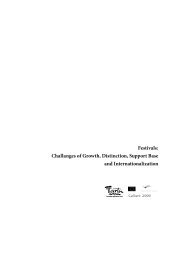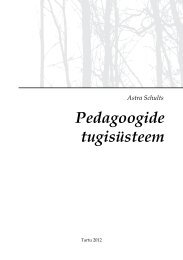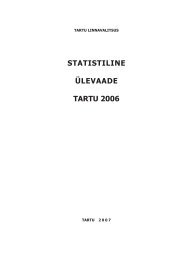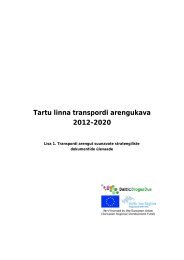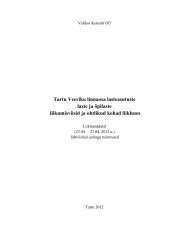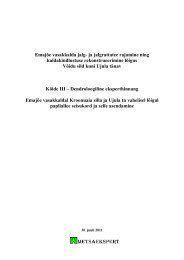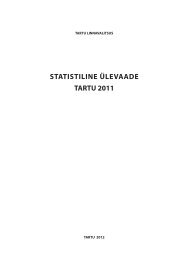Festivals - Fondazione Fitzcarraldo
Festivals - Fondazione Fitzcarraldo
Festivals - Fondazione Fitzcarraldo
You also want an ePaper? Increase the reach of your titles
YUMPU automatically turns print PDFs into web optimized ePapers that Google loves.
amplifiers and larger musical groups could perform there. For the festival it meant the<br />
release of an entirely new product.<br />
The first festival and all the following festivals of the St. Petersburg’s Kannon Dance<br />
Company came in to existence due to the need to introduce contemporary dance in<br />
Russia. Natalya Kasparova who had a ballet education participated in contemporary<br />
dance courses in Austria and she wanted to further her acquired skills. None of the<br />
schools in St. Petersburg taught contemporary dance techniques and therefore Vadym<br />
Kasparov decided to bring in a teacher from America and organise courses for all those<br />
who were interested. Unfortunately, no recognised dance school or a theatre was interested<br />
in the new style or wanted anything to do with the courses. Since the teacher<br />
from America was already en route to Russia, Natalya and Vadym Kasparov decided to<br />
organise the first chorus themselves and invite everybody in the city to participate. This<br />
initiative gave birth to the first Kannon Dance Company festival Open Look, followed<br />
by the National Competition for Young Choreographers, the Jazz Music and Dance Festival<br />
and the Dance Film Festival. The latter is a festival in the course of which it is taught<br />
how to make films for presenting and recording contemporary dance. The development<br />
of the Kannon Dance Company is a good example of developing step by step, so that<br />
each following step arises from the needs of the preceding step.<br />
Such examples are typical in case of festivals which are sparked by ideas and the need<br />
for creating something new. But how do festivals initiated by, for example, a city government,<br />
expand?<br />
In such events the development of the festival largely depends on the budget of the festival.<br />
The festival manager must remain within the limits of the budget and the manager’s<br />
professional experience helps to create a cultural programme which is fresh and novel<br />
and attractive for the audience.<br />
At the same time, many city festivals grow in terms of quantity, i.e. the number of participants.<br />
For example, the Cultural Night in Uppsala, the Christmas City Festival in Turku<br />
and the Tartu Hanseatic Days focus on the participation of local residents and cultural<br />
players. All culture groups of the city are given the opportunity to present themselves.<br />
In such events the duty of the festival manager is to attract as many participants as possible<br />
and to create the “us” feeling, the feeling of belonging and the feeling of valuing one’s<br />
city. One of the most important duties of the festival manager is to be an intermediary<br />
between the audience and the performer, between culture and other fields of endeavour<br />
and between local people and visitors/tourists.<br />
8<br />
Thus the international aspect will not arise from importing and introducing famous<br />
foreign performers. Such a festival is made internationally attractive by the exhibition of<br />
a huge concentration of local culture and values, which is interesting for domestic and<br />
foreign tourists alike.



